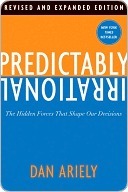More on this book
Community
Kindle Notes & Highlights
by
Dan Ariely
Read between
May 19 - November 5, 2021
humans rarely choose things in absolute terms. We don't have an internal value meter that tells us how much things are worth. Rather, we focus on the relative advantage of one thing over another, and estimate value accordingly.
people don't know what they want unless they see it in context.
we not only tend to compare things with one another but also tend to focus on comparing things that are easily comparable—and avoid comparing things that cannot be compared easily.
That's a lesson we can all learn: the more we have, the more we want. And the only cure is to break the cycle of relativity.
in order to make a man covet a thing, it is only necessary to make the thing difficult to attain.”
Socrates said that the unexamined life is not worth living.
If you accept the premise that market forces and free markets will not always regulate the market for the best, then you may find yourself among those who believe that the government (we hope a reasonable and thoughtful government) must play a larger role in regulating some market activities, even if this limits free enterprise. Yes, a free market based on supply, demand, and no friction would be the ideal if we were truly rational. Yet when we are not rational but irrational, policies should take this important factor into account.
“The most expensive sex is free sex.”
when a social norm collides with a market norm, the social norm goes away for a long time. In other words, social relationships are not easy to reestablish. Once the bloom is off the rose—once a social norm is trumped by a market norm—it will rarely return.
MONEY, AS IT turns out, is very often the most expensive way to motivate people. Social norms are not only cheaper, but often more effective as well.
But to make informed decisions we need to somehow experience and understand the emotional state we will be in at the other side of the experience. Learning how to bridge this gap is essential to making some of the important decisions of our lives.
It may be that our models of human behavior need to be rethought. Perhaps there is no such thing as a fully integrated human being. We may, in fact, be an agglomeration of multiple selves.
In running back and forth among the things that might be important, we forget to spend enough time on what really is important. It's a fool's game, and one that we are remarkably adept at playing.
if you tell people up front that something might be distasteful, the odds are good that they will end up agreeing with you—not because their experience tells them so but because of their expectations.
In all these conflicts, individuals from both sides can read similar history books and even have the same facts taught to them, yet it is very unusual to find individuals who would agree about who started the conflict, who is to blame, who should make the next concession, etc. In such matters, our investment in our beliefs is much stronger than any affiliation to sport teams, and so we hold on to these beliefs tenaciously. Thus the likelihood of agreement about “the facts” becomes smaller and smaller as personal investment in the problem grows. This is clearly disturbing. We like to think that
...more
The same approach should be used to settle arguments: The perspective of each side is presented without the affiliation—the facts are revealed, but not which party took which actions. This type of “blind” condition might help us better recognize the truth.


